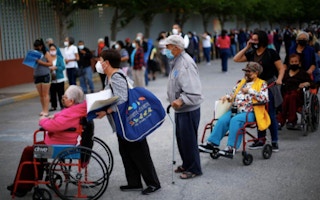The United States will share up to 60 million doses of AstraZeneca Plc’s Covid-19 vaccine with other countries as they become available, White House senior Covid-19 adviser Andy Slavitt announced on Monday.
With more than 130 million Americans - more than half of all US adults - having received a Covid-19 vaccine dose, the Biden administration has faced growing pressure to promote equitable vaccine distribution around the world.
The United States has pledged money to the global immunisation effort but until now has resisted calls to donate surplus doses or share vaccine technology.
By July, the country could have an oversupply of 300 hundred million coronavirus vaccine doses, according to a report by the Duke Global Health Innovation Center, even while developing countries face a multi-year wait to vaccinate the majority of their populations.
Should the Biden administration, then, continue to improve access to Covid-19 vaccines globally?
“The short answer is: ‘yes it should, like now, immediately,’” said Ruth Faden, a Johns Hopkins University bioethicist and vaccine policy expert.
“The harder questions are the ‘how questions.’ That’s when things start to get more complex.”
Fundraising
The easiest way for the United States to contribute would be to pledge money to the global immunisation effort, Faden said.
In February, the Biden administration pledged to give $4 billion to COVAX, a global scheme by the World Health Organization to distribute coronavirus vaccines to low- and middle-income countries, more than any other country.
The country has already distributed $2 billion of those funds, but is waiting on other countries to fulfill their own pledges before distributing the second half.
Even if COVAX were fully funded this year, it would be able to vaccinate only a quarter of the populations in the world’s 92 poorest nations, according to the Duke paper.
“I know that many countries are asking for the United States to do more, some with growing desperation because of the scope and scale of their Covid emergencies,” US Secretary of State Anthony Blinkin told a virtual fundraising event for COVAX last week.
Blinkin acknowledged the mounting pressure on the United States to help.
“We hear you. And I promise, we’re moving as fast as possible.”
“
Maybe some companies are nervous if you share [vaccines], but I think we’ll be back with boosters and other ways for them to make their money anyway.
Arthur Caplan, Division of Medical Ethics, New York University Grossman School of Medicine
Sharing intellectual property
Aid groups have also called on the Biden administration to wave international property rights for coronavirus vaccines so other countries have the ability to make their own.
Last week, Oxfam International published a letter signed by more than 100 former heads of state and Nobel laureates, urging the administration to act.
Arthur Caplan, the head of the Division of Medical Ethics at New York University Grossman School of Medicine, echoed the charity’s calls.
“I’d be giving that away immediately. There’s no reason in a plague to try and defend intellectual property given the needs of other countries,” Caplan told the Thomson Reuters Foundation.
“Maybe some companies are nervous if you share, but I think we’ll be back with boosters and other ways for them to make their money anyway.”
Other experts argue that breaking vaccine monopolies with a temporary waiver of World Trade Organization intellectual property rules is unnecessary and could prove chaotic.
Donate vaccines
Some aid groups and international leaders argue that wealthier countries such as the United States should be sharing their vaccine surplus now, as the country announced it would on Monday.
A letter backed by the Center for Strategic and International Studies, a Washington-based think-tank, calls on the United States to donate 10 per cent of its excess doses over the summer, and to bump it up to 50 per cent by the end of the year.
French President Emmanuel Macron in February also called on the United States and Europe to donate 5 per cent of their supplies to the global effort.
Two public health experts said, however, that donating doses would be “flawed”.
“We should start thinking about sharing vaccines with Michigan before we start sharing with Mauritius,” Caplan said.
The state of Michigan is facing the worst coronavirus surge in the nation, but has failed to persuade the federal government to give the state extra doses.
“Morally it’s right to try to assist your town, community, your neighbours, your country, before turning to others.”
Once hospitalisation rates stabilise and herd immunity, when roughly 70 per cent to 90 per cent of a population is resistant to the virus, is reached, the United States can start a “serious sharing programme,” Caplan added.
Loans
Alternatively, some experts are calling on the Biden administration to “loan” vaccines out to other countries, which it has already done to its neighbours, Mexico and Canada.
In March, the United States gave roughly 4 million doses of the AstraZeneca vaccine, which has been authorised for use elsewhere, but not in the United States, to Mexico and Canada.
The vaccines were given under a deal in which the United States expects to be paid back with doses in return later this year.
“That doesn’t actually reduce our overall supply, it’s more an issue of timing,” said Krishna Udayakumar, founding director of the Duke Global Health Innovation Center.
And timing is key, Udayakumar added, as the virus continues to mutate and new variants emerge.
“Even our health and our lives are not going to be protected unless we really take a global approach to turning a corner on the pandemic.”
This story was published with permission from Thomson Reuters Foundation, the charitable arm of Thomson Reuters, that covers humanitarian news, climate change, resilience, women’s rights, trafficking and property rights. Visit http://news.trust.org/climate.





















